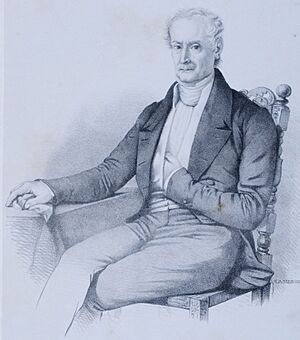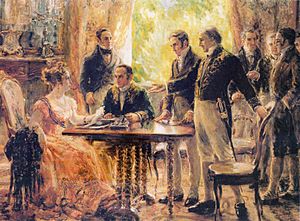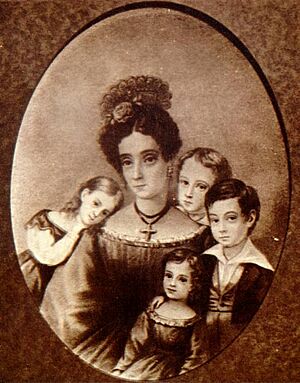Martim Francisco Ribeiro de Andrada facts for kids
Quick facts for kids
Martim Francisco de Andrada
|
|
|---|---|

Lithography by S. A. Sisson.
|
|
| Minister of Finance | |
| In office 7 September 1822 – 17 July 1823 |
|
| Monarch | Pedro I |
| Preceded by | Office established |
| Succeeded by | Marquis of Baependi |
| In office 24 July 1840 – 23 March 1841 |
|
| Monarch | Pedro II |
| Preceded by | José da Silva Maia |
| Succeeded by | Marquis of Abrantes |
| Personal details | |
| Born | 9 April 1775 Santos, São Paulo, State of Brazil |
| Died | 23 February 1844 (aged 68) Santos, São Paulo, Empire of Brazil |
| Occupation | Politician |
Martim Francisco Ribeiro de Andrada (born April 9, 1775 – died February 23, 1844) was an important Brazilian politician. He played a big part in Brazil becoming an independent country. He also served twice as the country's Minister of Finance, which means he was in charge of Brazil's money.
Contents
Early Life and Education
Martim Francisco Ribeiro de Andrada was born in Santos, São Paulo on April 9, 1775. At that time, Santos was just a small village. His parents were Colonel José Bonifácio Ribeiro de Andrada and Maria Bárbara da Silva. He had two famous brothers: Antônio Carlos and José Bonifácio de Andrada.
Studying in Portugal
Martim went to the University of Coimbra in Portugal. There, he earned degrees in philosophy in 1797 and mathematics in 1798. He also got a PhD in Natural Sciences. While at the university, he worked with a naturalist named José Mariano de Conceição Vellozo. They translated books about minerals and farming together.
Returning to Brazil
After his studies, Martim came back to Brazil. He was made the main inspector of mines in São Paulo state. In this job, he traveled a lot around São Paulo. He made many scientific discoveries and wrote them down. His brother José Bonifácio often joined him on these trips.
In 1820, he and his brother explored São Paulo to find gold. That same year, he became secretary and vice president of the temporary government in São Paulo. When Portugal tried to make Brazil a colony again in 1821, Martim and his brother José Bonifácio spoke out. They helped create a patriotic message on December 24, 1821.
Facing Challenges
In January 1822, Martim's brother José was in Rio de Janeiro, helping with the government. He was working to make Brazil independent. Portuguese supporters still had a lot of power. However, some of their actions started to make people unhappy.
In São Paulo, a general stopped people from seeking more freedom. Martim was removed from his government job in São Paulo. He was then sent to Rio de Janeiro as a prisoner.
Leading Brazil's Independence

Martim became the Secretary of State for Business and Finance. This was from July 4, 1822, to October 28, 1822. He was part of the first government of the new Empire of Brazil. He was briefly dismissed but then brought back as Minister of Finance on October 30, 1822.
Managing the Country's Money
When Martim became Minister of Finance, the new Empire of Brazil had no money. King John VI had taken everything valuable back to Portugal. Martim decided to follow a nationalist policy. This meant he put taxes on goods brought into Brazil, especially from Portugal.
On December 30, 1822, he signed a rule that added a 24% tax on foreign goods. He did not want to borrow money from other countries. Instead, he created a special loan that people had to contribute to for ten years. This loan was backed by money from the state of Rio de Janeiro. He also promised to make Brazil a land of freedom, which made people support him. He fixed the tax system and created a new office to manage taxes on products like coffee and tobacco.
Opposition and Time in Exile
The Andrada brothers were very active during this time. Their strong actions made them some enemies. The first government they were part of ended on July 17, 1823. After this, the Andradas became strong voices against the government.
Martim Ribeiro de Andrada was chosen to represent Rio de Janeiro in the Assembly. He was a powerful speaker. He was also the chairman of the Assembly for October 1823.
The "Night of Agony"
On November 12, 1823, the Emperor closed the Assembly. This event is known as the "Night of Agony". Martim and his two brothers were arrested. They were held until November 20. Then, they and their families were sent away to Le Havre, France, as exiles.
While they were away, Martim Francisco and Antônio Carlos were accused of trying to cause trouble. In 1828, a court started their trial. They were found innocent of the charges. They returned to Rio de Janeiro and were briefly imprisoned. On September 6, 1828, they were cleared of all charges and set free.
Returning to Public Service
In 1830, Martim Ribeiro de Andrada was asked to advise the Emperor. However, he turned down the offer. He was later elected to represent Minas Gerais in the government. He served from May 5, 1830, to June 10, 1833. He was also the President of the Chamber of Deputies for a short time in 1831.
He then represented São Paulo from May 3, 1836, to October 18, 1841. He specifically represented his hometown of Santos in the Assembly.
Second Term as Minister of Finance
On July 23, 1840, the Empire of Brazil was restored. Martim Francisco and Antônio Carlos Ribeiro de Andrada were appointed to the Council of the Crown by Emperor Pedro II of Brazil. Martim became the Minister of Finance again. This was from August 24, 1840, to March 23, 1841.
The country was facing money problems. But Martim believed Brazil would recover. He asked for foreign loans to help cover the country's debts. He was again President of the Chamber of Deputies from April 25, 1842, to January 2, 1843. He also advised the Emperor and was a member of a historical and geographical group in Brazil.
Martim Francisco Ribeiro de Andrade passed away in Santos on February 23, 1844. He was 68 years old. An old Brazilian book from 1861 said his name would always be remembered. It said he was a great supporter of Brazil's freedoms and independence.
Family Life
Ribeiro de Andrade married his niece, Gabriela Frederica. She was the daughter of Jose Bonifacio de Andrada e Silva. They married in Santos on November 15, 1820. They had three sons and two daughters.
- Martim Francisco Ribeiro de Andrada II (born 1825) became a deputy for São Paulo. He was also the Minister of Foreign Affairs in 1866. Later, he became president of the Chamber of Deputies in 1882.
- José Bonifácio the Younger (born 1827) was a writer. He became a senator of the Empire of Brazil. He also served as the Minister of the Navy for Brazil.
- Antônio Carlos Ribeiro de Andrada (born 1836) was a deputy for Minas Gerais in 1885. He also became a senator in 1891.
- Their daughters were Maria Flora de Andrada and Narcisa de Andrada.
 | Sharif Bey |
 | Hale Woodruff |
 | Richmond Barthé |
 | Purvis Young |


